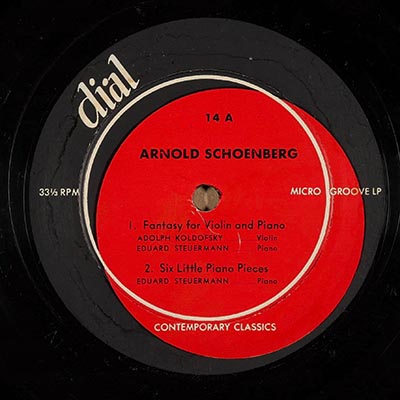The Arnold Schönberg Center digitizes public domain records and makes them available for free. Today we present a recording with two notable Schönberg interpreters.
In August 1949, Eduard Steuermann encouraged Ross Russell to expand the repertoire of his DIAL Records label from modern jazz to include classical modernism. Russell was receptive to the idea and wrote to Arnold Schönberg on August 15: “Mr. Steuermann is recording your piano cycles, Opus 19 and Opus 23 for Dial late this month. The work will be performed in a very fine studio and with Mr. Steuermann at the piano will of course receive a definitive performance.” The pianist had long been deeply acquainted with Schönberg’s piano works - the latter once called him his “ambassador at the piano.” However, there were delays in the production of the album: “Mr. Steuermann wants to record certain of Opus 19 and Opus 23 over again, which I am going to let him do next week, even though it is expensive to do so. And, if he can’t play these works in a definitive way, who can …?” (Russell to Schönberg, December 20, 1949) The pianist was known for his scrupulous approach: “I must also ask you not to be too indulgent to Steuermann’s wishes to play it over and over again, until there is nothing which he does not like. […] It is my opinion that it has no sense to aim for a perfection which is not human.” (Schönberg to Russell, January 13, 1950)
The two piano cycles were combined with the Phantasy for Violin with Piano Accompaniment, op. 47, written in 1949 and premiered in September 1950 on the composer’s 75th birthday. The violin part was played by Adolph Koldofsky, who had worked out the piece with the composer in terms of playing technique. In a telegram to Schönberg, Russell was equally enthusiastic about the composition as well as the performers: “Fantasy which combines beauty strangeness and logic truly wonderfully last night in performance for league and today at DIAL record session. Steuermann and Koldofsky superb” (December 29, 1949). The record was released in 1951, and the liner notes were written by the conductor, composer, and music critic René Leibowitz, who was intimately familiar with Schönberg’s work. Leibowitz recommended the recordings as “a valuable asset to all those who are interested in the music of Schoenberg in particular and in the evolution of contemporary music in general.” In our audio database you can listen to the complete record and read the accompanying text.

